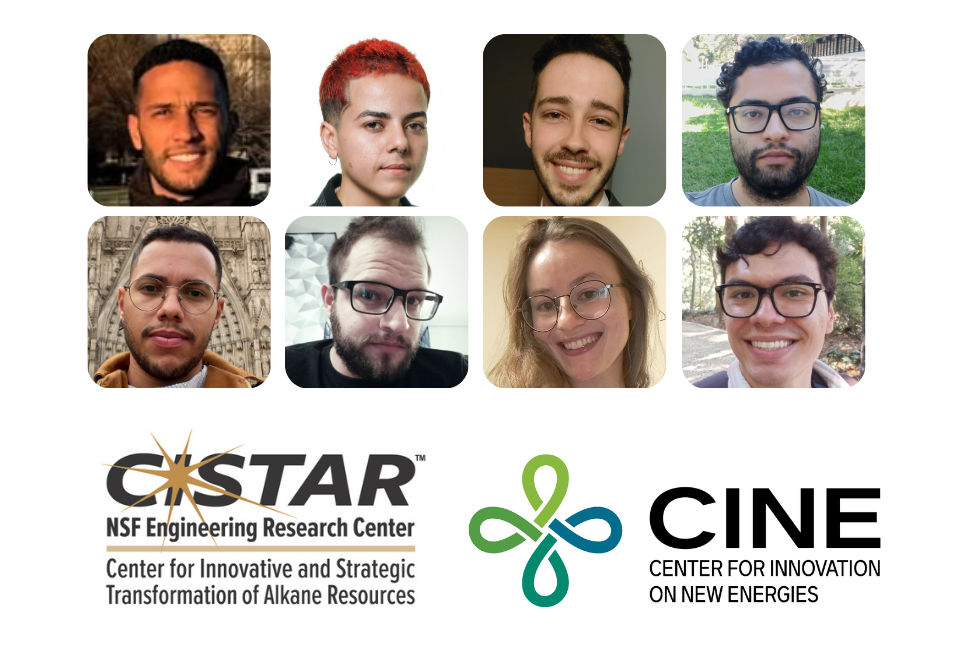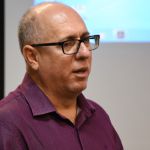CINE students participate in international course to train leaders for the energy transition

Developing essential skills for global energy leaders was the goal of a course attended by eight master’s and doctoral students from all the research divisions of CINE.
Entitled Growing Global Energy Leaders Program (GGEL), the course was held online over six weeks, between June and August of this year. In addition to CINE members, the course brought together young people from two other multi-institutional energy research centers, RCGI (Brazil) and CISTAR (USA).
Through active listening and building empathy techniques, among other tools, participants were able to develop the skills to build more enjoyable and productive intercultural scientific collaborations.
“It’s amazing to work with people from different parts of the world and to learn about new cultures, but it can also be quite challenging,” says Luana Schneider Moreira, a member of the Computational Materials Design division at CINE, who interacts daily with people from countries such as Mexico, India, Iran, and Pakistan in her doctoral studies at IQSC-USP. “That’s why the GGEL course was so important to me—it taught me how to communicate and engage effectively with people from such diverse backgrounds,” she adds.
The course also led participants to reflect on the social impact of their research. “In the course, I understood that involving local communities and different cultures from the beginning of projects helps to create more effective and inclusive solutions,” comments doctoral student Charles Alves Nogueira de Almeida, who works on the development of low-cost solar cells within CINE’s Energy Generation division.
The most interesting classes
For Luana, the most significant activity of the course was an assignment in which she had to speak personally with someone who had a different opinion from hers about the energy transition. “It required me to listen without
prejudice and truly try to understand their point of view,” describes the doctoral student. “In the end, by looking at this person’s life circumstances and the information they are exposed to, I could see why their opinion differs so much from those who work with the energy transition on a daily basis,” she says.
In Charles’s opinion, the most striking activity was a debate on artificial intelligence, ethics, and energy, in which participants discussed the social benefits of this computational tool, but also its impact on society and the environment. “This discussion was special because it united science, sustainability, and social responsibility, showing that the role of a scientist goes far beyond the laboratory,” comments Charles. “Developing new technologies without considering their long-term effects is not enough; it is necessary to think about sustainable solutions that integrate society and the needs of communities,” he says.
The course was organized by CISTAR and featured two instructors from the center’s team, Professors Denise Driscoll (Purdue University) and Jennifer Cole (Northwestern University), as well as guest speakers, such as Professor Juarez L. F. Da Silva (IQSC-USP), who spoke about global partnerships in the area of computational design and characterization of materials. Juarez is a member of CINE, where he coordinates the CMD division and the education and dissemination area.
The course was one of the initiatives of the Center-to-Center (C2C) partnership involving CINE, RCGI, and CISTAR, with support from FAPESP and the National Science Foundation. Since 2022, CINE members have been participating in various actions within the partnership, such as collaborative scientific projects, technical visits, research internships, and online seminars.
CINE members who participated in the GGEL course: Charles Alves Nogueira de Almeida (doctoral student in the EG division), Erick Alves Santos (doctoral student in the AES division), Felipe Staciaki da Luz (doctoral student in the LCH2 division), Guto Garcia dos Santos (at the time of the course, a master’s student in the AES division), João Felipe Pierdona Antoniolli (doctoral student in the AES division), Luana Schneider Moreira (doctoral student in the CMD division), Natan Moreira Regis (master’s student in the CMD division), and Tales Moreira Tavares (doctoral student in the EG division).
Contact

Juarez L. F. Da Silva
USP

